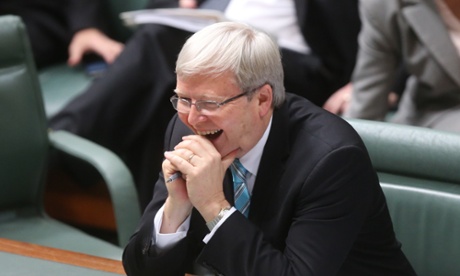“Lest we forget what happened last time”
Kevin Rudd’s return could herald a second Australian climate election
The Labor leader’s return to the Australian prime ministership could see a repeat of 2007’s ‘climate change election’

Rudd was elected in 2007 saying that climate change was the “the greatest moral, economic and environmental challenge of our generation”. In many ways, 2007 was the climate change election.
The first act Rudd took as prime minister was to ratify Kyoto, a symbolic break from the lead-footed conservative government under John Howard. A price on carbon was the major policy that the new Labor government saw to reduce carbon emissions, called the carbon pollution reduction scheme.
The scheme was defeated in the Senate in 2009 after the Greens party refused to support it, and voted with the Liberal and National parties to oppose it. Then the dismal efforts of Copenhagen further dampened efforts for climate action. Rudd’s final climate act as prime minister in 2010 was to announce that the carbon pollution reduction scheme would be shelved.
Australia got its price on carbon under the prime ministership of Julia Gillard. Gillard, whatever you think of her, was remarkable in her ability to forge consensus in a hung parliament. The Greens party and independent MPs supported the Clean Energy Future Act, which in most ways was similar to Rudd’s carbon reduction scheme, albeit with more investment in renewable energy.
During this time, as I’ve written about earlier, the conservative opposition leader, Tony Abbott, ran an unrelenting fear campaign against the carbon price. Support for the carbon price from 2010 to 2012 fell sharply, until July last year when it came into effect. Since then, public support in Australia has increased for the carbon price.
The minister who had carriage of the Clean Energy Future Act was Greg Combet. Widely respected as a man of great integrity and enormous capabilities, Combet became responsible for a super ministry, covering industry, innovation and energy efficiency, as well as climate change. His negotiating skills, honed as secretary of the Australian Council of Trade Unions, saw the carbon price become law.
On Wednesday night, Rudd was returned as leader of the Labor Party.
What could this mean for climate policy in Australia? Is climate change still the greatest moral challenge of our generation?
At the press conference where he announced his intention to challenge Julia Gillard, Rudd said:
Australians want a real policy debate on our vision for the country’s future and Mr Abbott’s vision for the future of our economy and jobs, on national security, on education, on health, on climate change and how we would make these competing visions work.
As in 2007, Rudd has laid out the pillars of this election campaign around a set of key policies. One of those is climate change.
In many regards, Labor’s policy on climate change has been to focus on the carbon price and developing renewable energy. It is doubtful that Rudd would be proposing significant changes to Labor’s climate or energy policies.
With the resignation of Greg Combet, a supporter of Julia Gillard, it is unclear who will take over as minister for climate change. But, with both Labor and Liberal promising just 5% reductions in carbon emissions, part of Rudd’s pitch to the electorate on Wednesday was to highlight Tony Abbott’s scepticism about whether climate change exists at all.
For supporters of strong action on climate change, the main solace from the return of Rudd is that if he wins, he will defend carbon pricing and renewable energy targets. This also comes on the back of Barack Obama’s enormous announcement that the USA now has a climate strategy focused on cutting carbon emissions by 17%.
In the meantime, from his performance on Wednesday, we may be able to expect more debate on climate change, and more scrutiny of Tony Abbott’s non-policy of “direct action”. Abbott has repeatedly said: “the next election will be – if nothing else – a referendum on the carbon tax”.
This year’s Australian election could see a repeat of 2007 election and be another climate change election.
- Share
- inShare

